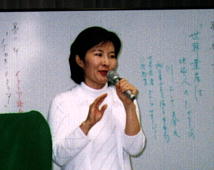NO.170-3
◎UNESCO Cultural Lecture◎
Sponsored by the Meguro Board of Education and managed by the Meguro UNESCO
Association
| "World Heritage: Treasures on the Planet Earth" |
Date: Sept. 14 (Thu.) 18:30-20:00
Place: Midorigaoka Bunka Kaikan
Speaker: Ms. Chiharu Kawakami, Group Manager of World Heritage/International
Education for UNESCO Association in Japan. With some 60 participants listening
attentively ,

including the students of the Introduction to Italian course, Ms. Kawakami
started the lecture with a quiz. She asked, "What is the symbol of
UNESCO modeled on?", "Where is the headquarters of UNESCO?".
She then explained the activities and the history of UNESCO. She said,
"Nongovernmental activities of UNESCO started in Japan and spread
to many parts of the world. The enthusiasm of Japanese citizens helped
Japan to gain membership in UNESCO." She then delivered her lecture
in an easy-to-understand way on the Literacy Campaign and Japan originating
the World Terakoya Movement, which UNESCO has actively engaged in to teach
reading and writing to the illiterate in the world.
Then, World Heritage was introduced on VTR, with an explanation of The
Convention Concerning the Protection of the World Cultural and natural
Heritage.e. She cited a case of international cooperation which saved the
Abu Simbel Temple in Egypt from sinking into a dam. She said, "Some
World Heritage sites face serious dangers, ranging from natural disasters,
acid rain caused by environmental pollution, the destruction of the environment
brought about by massive development and destruction and pollution caused
by careless tourists, which make it very difficult to conserve and restore
World Heritage sites." She also said with enthusiasm, "World
Heritage is not the only one that is valuable. It is also important to
preserve and cherish the nature and culture around us. Therefore, much
is expected from the role of nongovernmental UNESCO."
I left the lecture room with the thought that Japanese people tend to
mistake World Heritage for a certificate to be a tourist attraction, but
it really is not.
◆After the lecture, an orientation was given by the lecturer, Marino
Salvio to the students of the Introduction to Italian course.
By Yoshizawa
Date: Sept. 11 (Mon.) 18:30-20:00
Place: Moriya Kyoiku Kaikan
Speaker: Mr. Noriaki Sagara, Director, Department of Overall Planning and
Coordination, National Institute for Educational Research of Japan
Mr. Sagara started the lecture by quoting the words of Mr. Haruhiko Kindaiti,
"Human beings have characteristics as does society" to explain
what culture is. He explained culture in the form of language the people
use, then from the standpoint of etymology. He then explained how culture
is different from civilization. He said, "Japan is an unusual country
in that there is only one language. On the other hand, in France, there
are many other languages than French, such as Corsican, Italian, Alsace(German),
Bretagne, Celtic, langue d'oc, Catalan, ad Breton. In that sense, it can
be said that Japan is now losing its culture. The language of young people
is not Japanese. The French people esteem French highly precisely because
there are many other languages.
"The purpose of education is to hand down the value which each culture
has nurtured. Students learn the value because their culture approves it.
Teachers should teach the value with authority. It is impossible to make
culture inherited, if teachers have lateral thinking which many people
accept. I am afraid that Japan may lose its own culture.
"In the world of Noh and Kabuki, of which structure is unchallengedly
vertical, culture has been passed on. Although a family is not such a special
society, each family should have something to be inherited. Parents should
bring up their children with parental authority." Then he asked,"How
are children being brought up in your family?" I think the participants
must have reflected on what the situation in their family is.
In the end, he advised the students of French language courses to consult
a dictionary as often as possible.
(The lecturer: An executive Director of Meguro UNESCO Association)
◆*After the lecture, an orientation was given to the students of the
Introduction to French course.
By miyazaki&Hirata
|
|
◎National UNESCO Administrators' Training Session
The National UNESCO Administrators' Training Session for the Year 2000
took place on September 16 and 17 in Nihon Seinen Kaikan, attended by
95 members, 5 of whom are members of the Meguro UNESCO
Association, including President Kato. |
|
3